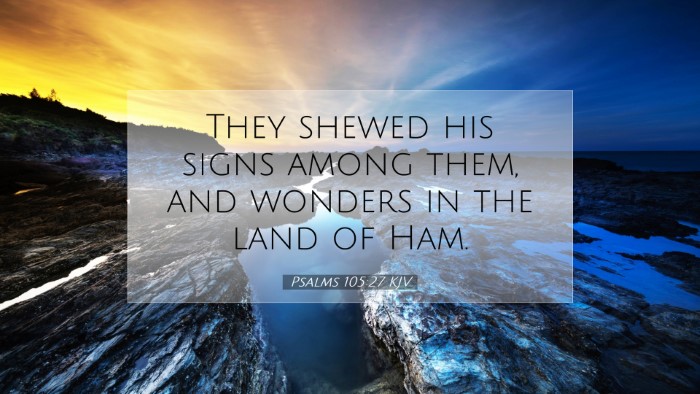Commentary on Psalms 105:27
Psalms 105:27 states, "They showed his signs among them, and wonders in the land of Ham." This verse captures the miraculous acts of God performed through His servants, particularly during the extraordinary events of the Exodus. It emphasizes the powerful presence of God's signs and wonders and how they affirmed His sovereignty and glory to the people of Israel, as well as to the surrounding nations. Below we provide a detailed commentary drawn from notable public domain sources.
Overview of the Context
This verse sits within a historical psalm recounting God's faithfulness to Israel. It celebrates God's covenant with Abraham, the trials of Joseph, the deliverance from Egypt, and the miraculous signs accompanying their liberation. The context highlights God's active involvement in history, particularly His ability to intervene for the sake of His people.
Commentary Insights
1. God's Signs and Wonders
Matthew Henry notes that the "signs" refer to the remarkable acts of divine intervention. He emphasizes that these signs were meant both to strengthen the faith of the Israelites and to convince the Egyptians of God's supreme power. The signs performed were not mere displays of power; they were deeply intertwined with the redemptive purposes of God. Henry explains that through these wonders, God demonstrated His commitment to His covenant with His people.
Albert Barnes adds that the term "signs" carries the connotation of miracles that are intended to convey a message about God’s nature. He indicates that these signs included plagues and other acts that were signs of impending judgment against Egypt, while also assuring Israel of their deliverance. Barnes emphasizes that these wonders were manifest not only as acts of punishment but also as acts of mercy towards Israel, granting them assurance of deliverance.
2. The Land of Ham
The reference to "the land of Ham" in this verse, as highlighted by Adam Clarke, refers to Egypt, which is traditionally associated with Ham, one of Noah's sons. Clarke elaborates on the significance of this geographical designation in understanding God's judgment and power over nations. He asserts that God's signs in "Ham" signify His dominion extending even over the places of oppression and bondage, demonstrating that no earthly power can resist the will of the Almighty.
3. Affirmation of Faith
This verse serves as an affirmation of faith and an encouragement to the people of Israel. According to Matthew Henry, the account of the signs and wonders is purposefully recounted to evoke remembrance of God's past actions. This was vital during times of uncertainty, serving to bolster faith among believers by reflecting on God’s past faithfulness.
Albert Barnes similarly points out that recalling these acts can assure contemporary believers that God has not abandoned His people. The divine intervention demonstrated in these signs provides a historical precedent for God’s active involvement in the world. Barnes implies that believers today can draw strength from this assurance that God's power and mercy continue to affect their lives.
4. Theological Implications
The theological implications of Psalms 105:27 are vast. Adam Clarke suggests that the verse illustrates God's faithfulness to His promises. It highlights the consistency of God's character throughout history, serving as a reminder that He is still actively engaged in the lives of His people. Clarke’s analysis draws attention to the continued relevance of these biblical accounts for modern-day believers and scholars, contributing to an understanding of God as a historical and present-day figure of action.
Matthew Henry highlights the importance of understanding signs and wonders as both historical occasions and theological truths. He underscores that every sign performed was not arbitrary but purposefully executed to reveal God's nature and purposes. This kind of interpretation encourages deeper theological reflection on how God's actions throughout history can inform current faith practices.
Application for Today
The insights from Psalms 105:27 challenge pastors, students, and theologians to consider how God continues to work in miraculous ways today. Albert Barnes's assertion that God's nature is unchanged suggests a call to action for modern believers to seek out and acknowledge the signs of God's work in their lives.
Matthew Henry urges the faithful to recount God's past faithfulness as a source of strength to face present trials. This verse underscores the need for the Church to teach its members the importance of remembering God's deeds, not only in Scripture but also in personal testimonies of faith.
In a world of uncertainty, Adam Clarke's reflections encourage believers to look for evidence of God's work among them. This aligns with the biblical mandate to proclaim God’s wonders to future generations so that they may also trust in the Lord's faithfulness.
Conclusion
The analysis of Psalms 105:27 reveals a rich tapestry of God's faithfulness, power, and presence throughout history. By considering the insights provided by commentators such as Henry, Barnes, and Clarke, readers can gain a deeper understanding of how God’s miraculous signs have shaped His covenant people and how they continue to serve as a reminder of His sovereignty in the lives of believers today.


